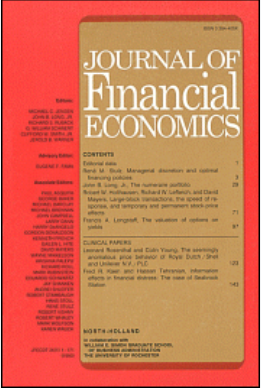披露与冷却:内幕交易规则分析
IF 10.4
1区 经济学
Q1 BUSINESS, FINANCE
引用次数: 0
摘要
我们分析了证券交易委员会最近出台的两项内幕交易法规:强制披露和 "冷静期"。前者要求内幕交易者在通过交易计划时披露交易计划,后者则规定交易前有一个延迟期。这些政策会影响投资者的交易利润、风险分担,进而影响他们的福利。如果内部人有足够大的对冲需求,与 "阳光交易 "的传统观点不同,信息披露会降低所有投资者的福利。在我们的校准中,较长的冷却期有利于投机者,其对内部人和对冲者的影响取决于是否已经实施了信息披露政策。本文章由计算机程序翻译,如有差异,请以英文原文为准。
Disclosing and cooling-off: An analysis of insider trading rules
We analyze two insider-trading regulations recently introduced by the Securities and Exchange Commission: mandatory disclosure and “cooling-off period”. The former requires insiders disclose trading plans at adoption, while the latter mandates a delay period before trading. These policies affect investors’ trading profits, risk sharing, and hence their welfare. If the insider has sufficiently large hedging needs, in contrast to the conventional wisdom from “sunshine trading”, disclosure reduces the welfare of all investors. In our calibration, a longer cooling-off period benefits speculators, and its implications for the insider and hedgers depend on whether the disclosure policy is already in place.
求助全文
通过发布文献求助,成功后即可免费获取论文全文。
去求助
来源期刊

Journal of Financial Economics
Multiple-
CiteScore
15.80
自引率
4.50%
发文量
192
审稿时长
37 days
期刊介绍:
The Journal of Financial Economics provides a specialized forum for the publication of research in the area of financial economics and the theory of the firm, placing primary emphasis on the highest quality analytical, empirical, and clinical contributions in the following major areas: capital markets, financial institutions, corporate finance, corporate governance, and the economics of organizations.
 求助内容:
求助内容: 应助结果提醒方式:
应助结果提醒方式:


